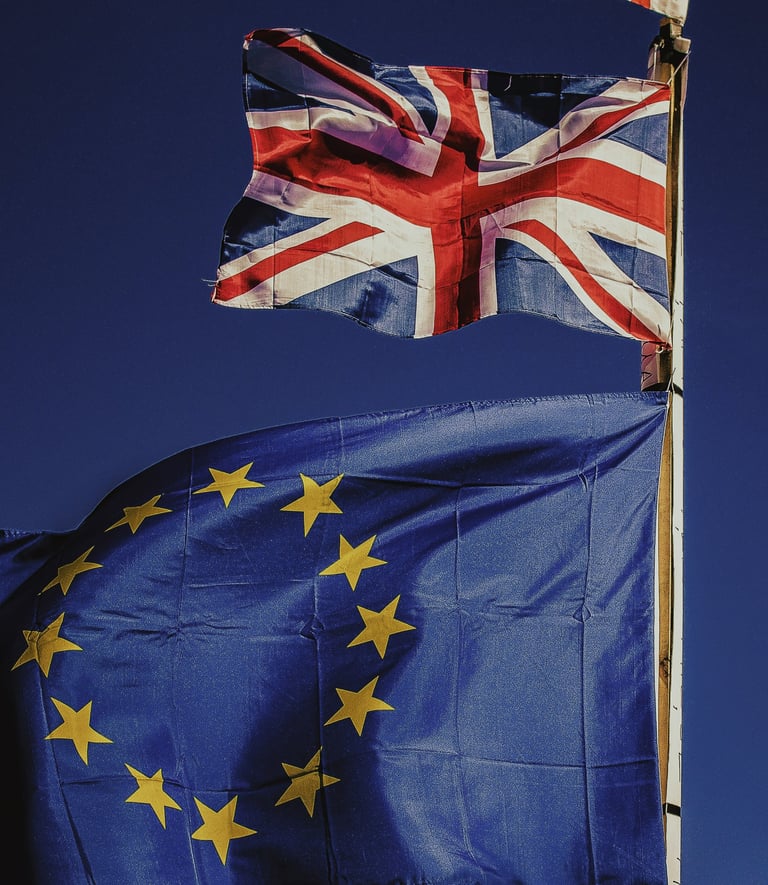Why I Voted for Brexit – and What It Means Today
Advantages of Brexit
Sovereignty Restored
The UK regained full control over laws, borders, immigration, and trade policy without needing EU approval.Immigration Control
Freedom to design our own immigration system, prioritising skills over EU freedom of movement.Independent Trade Deals
The UK can negotiate its own trade agreements, such as those with Australia, Japan, and CPTPP countries.Regulatory Flexibility
Potential to diverge from EU rules and create more tailored laws for UK businesses.Budget Contributions Ended
No longer contributing to the EU budget frees up funds for domestic priorities (though this is debated).Democratic Accountability
Power now lies closer to the people, making it easier to hold the UK government accountable for its decisions.
Disadvantages of Brexit
Economic Disruption
Increased trade barriers with the EU have led to delays, higher costs, and reduced exports for many businesses.Labour Shortages
Sectors like agriculture, healthcare, and hospitality have struggled due to reduced access to EU workers.Northern Ireland Tensions
The Northern Ireland Protocol created friction in the UK internal market and contributed to political instability.Loss of Influence
The UK no longer has a seat at the table in EU decision-making, despite being affected by some EU regulations.Reduced Investment and Growth
Some studies suggest Brexit has lowered GDP growth and deterred foreign investment compared to EU membership.
Brexit and the Latest UK-EU Agreement
Recent announcements of deeper UK-EU cooperation—on trade, science, or mobility—show that Brexit hasn’t meant isolation. In fact, it’s opened the door to more flexible partnerships, built on mutual interest and national control. This is Brexit working: allowing Britain to choose cooperation where it benefits us, without being tied to rules made elsewhere.
But Brexiteers are right to be cautious. Some fear these new deals risk slowly eroding what we fought to achieve—sovereignty, independence, and regulatory freedom. If we start aligning too closely with EU rules, or making financial contributions without influence, we could find ourselves back under EU sway without rejoining. That’s not what people voted for. We must ensure that cooperation doesn’t come at the cost of accountability, border control, or self-government. Brexit was about making our own choices and that includes when to say no.
Democracy and Accountability Matter
One of the most overlooked but vital advantages of Brexit is that it brought decision-making and responsibility back to Westminster. Voters now have a clearer line of accountability. When promises aren’t kept or policies fail, we can hold our leaders to account directly at the ballot box.
The recent collapse in support for my party, the Conservative Party, is a prime example: many voters felt let down on immigration, the economy, and the delivery of Brexit’s potential. That discontent translated into electoral consequences. The same will be true for any future government, including the current Labour government, if they fail to respond to the public's concerns.
That’s how a healthy democracy should work: with power comes responsibility, and with responsibility comes consequences.
A Final Thought
This renewed accountability has also given rise to political alternatives. It’s why we’ve seen the birth and rise of the Reform Party, which is gaining ground by connecting with voters who have felt unheard by the mainstream parties for years. That engagement by the electorate—whether you believe it is for better or worse—is a sign of a more responsive, revitalised democracy.
And whilst voters are choosing not to vote for my party right now—and I truly understand why—I'll continue to do everything I can to help my party listen, adapt, and rebuild. My goal is to shape a party that reflects the wants and needs of the voter, rooted in our core Conservative values: personal responsibility, national pride, strong communities, and accountable government.


I voted for Brexit because I believe in the principle of national sovereignty—that decisions about our laws, borders, and future should be made by those directly accountable to the British people. Leaving the EU gave us the opportunity to regain democratic control and shape a future that reflects our own priorities and beliefs, rather than compromising within a one-size-fits-all system.
I fully accept that Brexit has brought challenges. The transition disrupted trade and created real difficulties for businesses, workers, and communities—particularly in the early years. These are valid criticisms.
But short-term pain must be weighed against long-term potential. With independence comes responsibility—and opportunity. The UK can now forge its own path, build tailored trade agreements, and design policies that better suit our economy, environment, and communities. And if governments get those policies wrong, they can be held to account at the ballot box.
Another key reason I supported Brexit is the belief that those who make the rules should be answerable to the people who live under them. When decisions were made in Brussels by unelected officials or distant institutions, it was harder for voters to hold anyone accountable. Now, with power returned to Westminster, voters have the ability to reward good governance—or punish failure. Brexit didn’t just restore sovereignty; it restored democratic accountability.
Such freedom is not without cost, but I believe it gives us the best chance to build a fairer, more responsive, and more resilient United Kingdom in the decades ahead.
My office
c/o Member Services, County Hall, Beverley, United Kingdom,
HU17 9BA
Contact Details
councillor.christon-whyte@eastriding.gov.uk
07564 624563
Serving the communities of:
Aldbrough, Bilton, Burstwick, Burton Constable, Burton Pidsea, Catwick, Coniston, East Garton, Ellerby, Elstronwick, Hatfield, Humbleton,
Long Riston, Rise, Skirlaugh, Sproatley, Swine, Wawne, Withernwick
Promoted by Cllr Samantha Christon-Whyte c/o Member Services Team, County Hall, Beverley, HU17 9BA
Copyright 2025 All rights reserved.